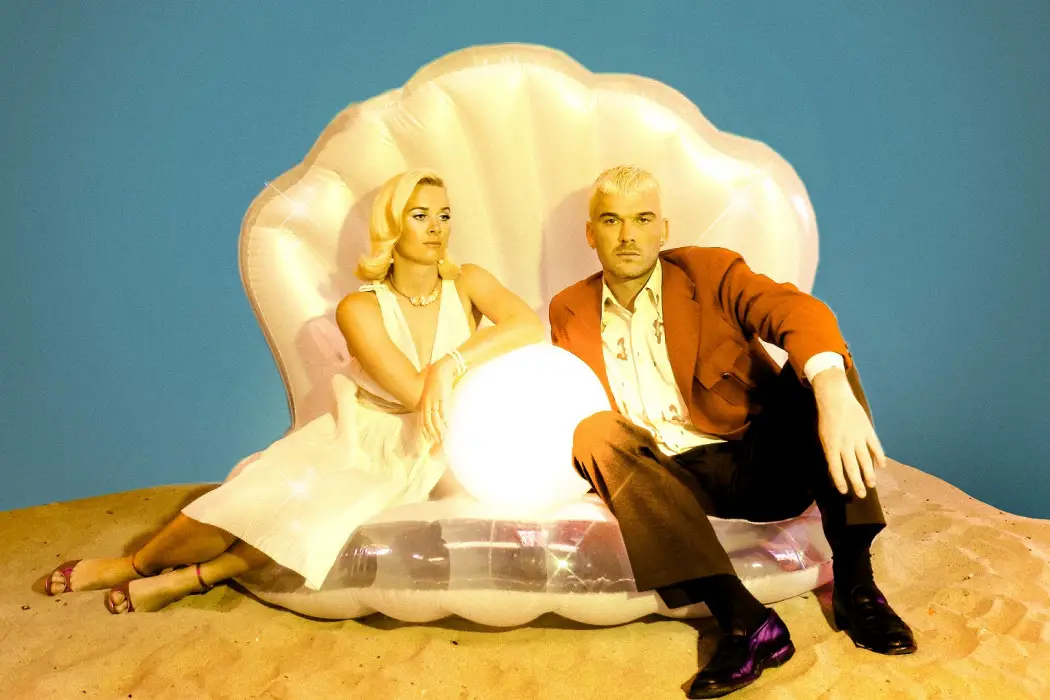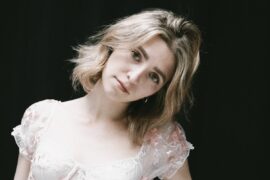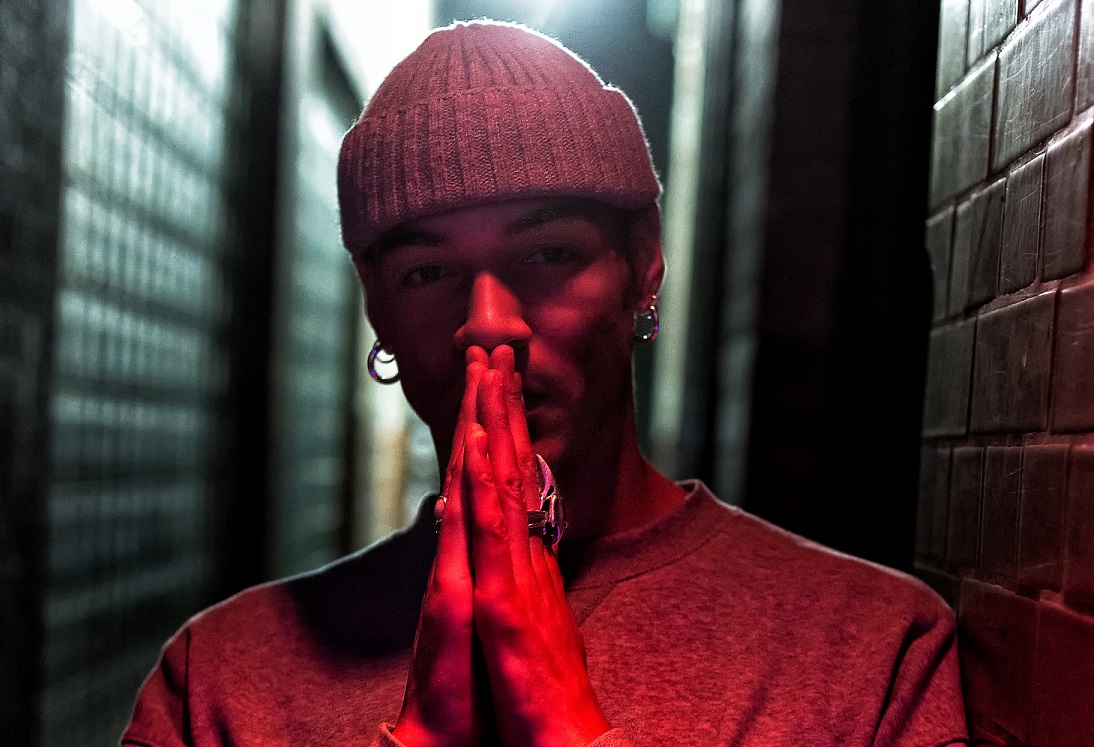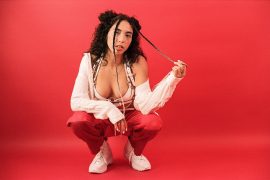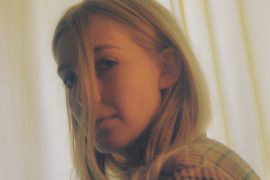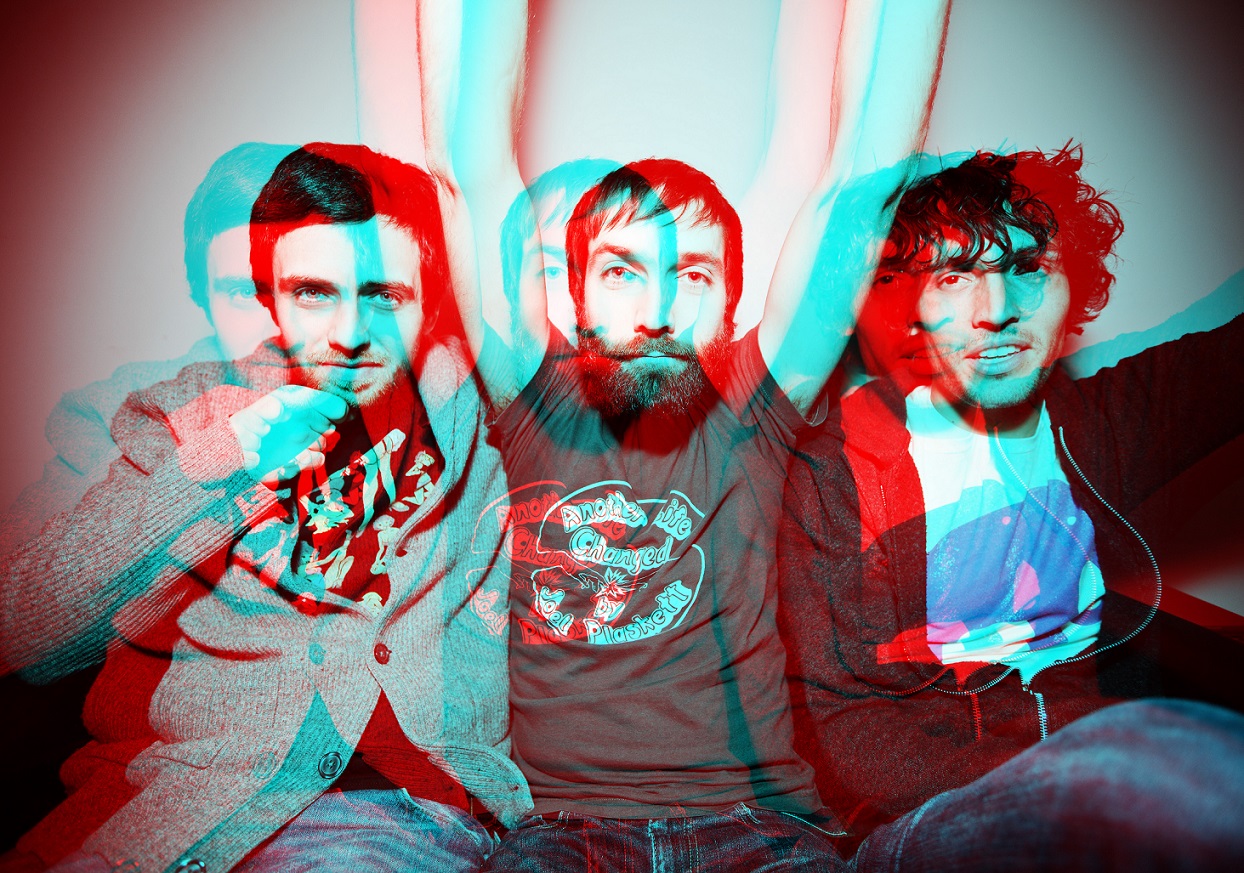Sibling pop duo Broods discuss emotional vulnerability, authenticity in music, and the importance of their third album ‘Don’t Feed the Pop Monster.’
— —
It’s about the impact; it’s not about the following.
The past few years have been a true roller coaster of emotion for New Zealand brother-sister pop duo Broods: From leaving Auckland for Los Angeles and switching labels, to rediscovering themselves and channeling that energy into their music, Broods have seen more than their share of ups and downs.
In the wise words of 24-year-old Georgia Nott, “Everything has to be ripped apart, so that you can put it back together in the right way.” For Georgia and her 26-year-old brother Caleb, a period of severe personal and professional instability and unrest blossomed into the empowered self-awareness and self-discovery they display on their third album, Don’t Feed the Pop Monster (released February 1, 2019 via Neon Gold / Atlantic Records)… and the results are phenomenal.

Coming off the heals of 2016’s Conscious, Broods approached their new music with a “Let’s try anything!” mentality.
“Let’s do whatever we feel,” Georgia explains, “and that’s how we found the most authentic version of ourselves.”
Emotionally enlightened and musically marvelous, Don’t Feed the Pop Monster is a stunning indie pop masterpiece brimming with philosophy and individuality. Opening track “Sucker” reintroduces Broods with an impassioned reflection on societal pressure to conform, with Georgia singing: “Almost lost myself just trying to be like somebody else / I could never get it right, guess it’s just something I can’t help.“
She explains: “I think it’s just such a good way to start, because it does set the tone to the attitude that we had going into this, which is: We all get caught up in what’s in and what’s cool, and trying to keep up with what we should be thinking / feeling / wearing / saying… it’s not until you actually come back into yourself that you really can be an authentic version of yourself.”
For Broods, the concept of Don’t Feed the Pop Monster stems from their firm belief in authenticity – a word the pair don’t throw around lightly. We make our best art when we are being true to ourselves. Once the Georgia and Caleb found their footing, they took off – and made this album.
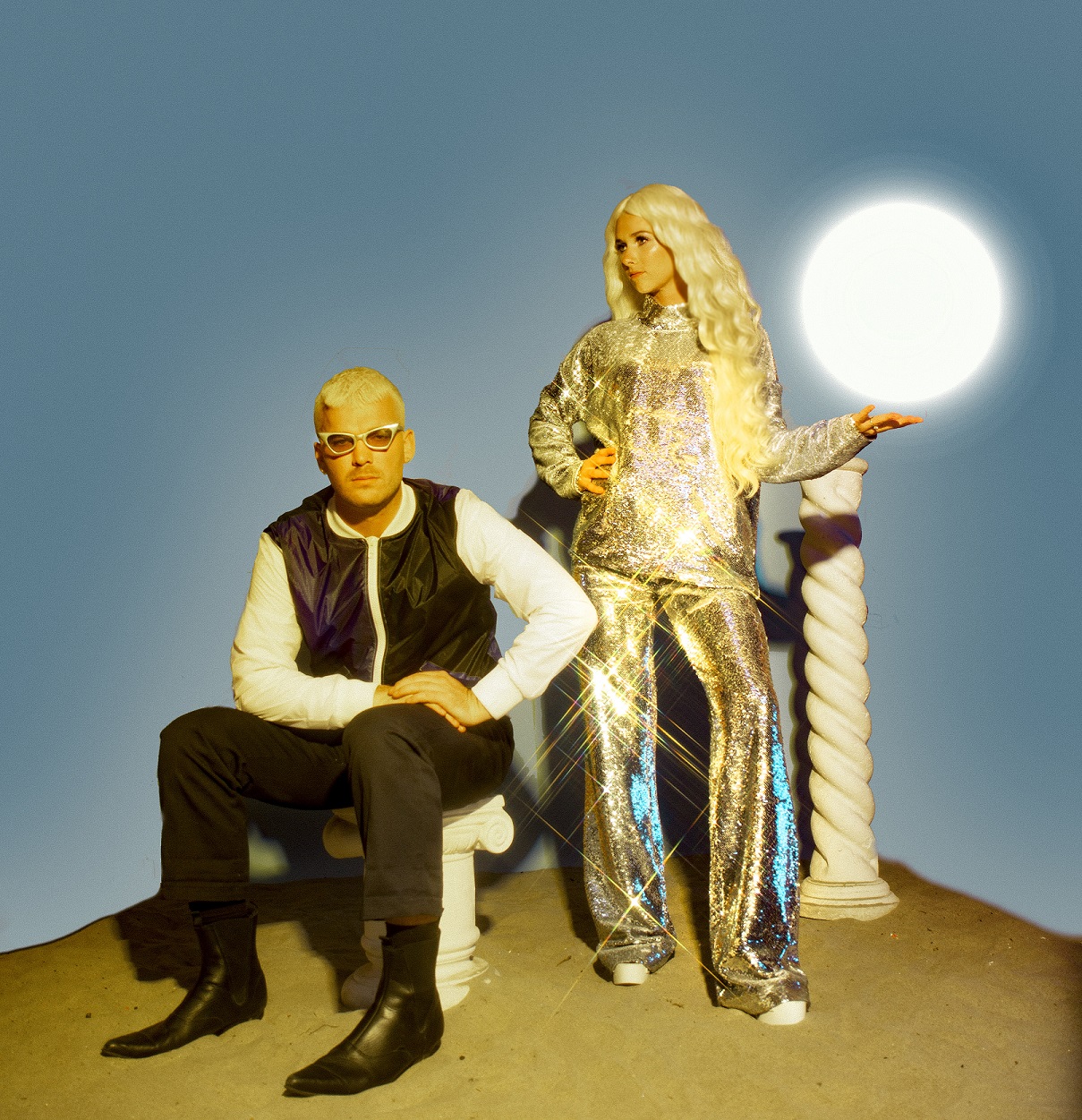
As Don’t Feed the Pop Monster progresses, Broods shift attention onto deeper matters of individual experience and emotion.
An impassioned rebuke of misogyny, “Old Dog” is a spirited affirmation of female identity. “Too Proud” is an open, intimate dialogue about mental health struggles. “Dust” is a deeply personal outpouring of anxiety.
Juicy lead single “Peach” offers a passionate embrace of life’s highs and lows, serving as a reminder “that it’s necessary to feel everything.”
“When you are constantly seeking inspiration from your surroundings you have to keep very open,” Georgia shares. “When you are always open, you are much more easily affected by things. You wear your heart on your sleeve, as the saying goes. It is so exhausting and amazing and terrifying and satisfying all in one. For us, it is worth the down times if we get those moments of complete euphoria. And then there are those moments of bliss: Those moments where everything feels so balanced you could just weep with gratitude. I want to feel the full spectrum, no matter how many times I have to break and put myself back together to do that.”
It’s so much better to feel something, than nothing.
What these words fail to accurately capture are the catchy, provocative, and utterly immersive sonic characteristics of Broods’ new music. The Nott siblings have hit an all-time high in this record: Just as they captured a wide range of emotion, they have also captured a wide breadth of sound. Tracks like “Peach,” “Everything Goes (Wow)” and “Hospitalized” are exuberant, dancey explosions of color; “Falling Apart” and “Everytime You Go” offer mellow, spacious pop with a moody bent; “Old Dog” is a spikey punk rocker; and “To Belong” is a unique electropop entity unto itself, a mysterious and multi-layered phenomenon that must simply be experienced in order to be understood.
“When you say something that is so brutally honest, you can’t take away anything from it,” Georgia reflects. “You can’t steal any of its importance, and you can’t diminish any of its relevance because it’s so true to who we are… We’re singing about human nature.”
To what do Broods ascribe their emotional maturity and musical growth? Georgia calls it “confident vulnerability.”
”It’s a self-awareness; it’s an acute self-awareness where you are not afraid of your emotions… We totally retreated into ourselves, and we kind of swam right to the bottom of ourselves and dug deep! It’s quite liberating to get that personal. It’s weird, because as personal as the record is, I’m so not afraid of people hearing how vulnerable we can be; I’m just not afraid at all!”
Broods’ third album is majestic, exciting, thought-provoking, and timeless – an exploration of humanness and human nature. Georgia and Caleb Nott truly suffered for this record, and the resulting music is absolutely gorgeous and inspiring.
Atwood Magazine sat down with Broods a week before release day to discuss emotional vulnerability, authenticity in music, and the importance of their third album. Dive into our full-length interview below!
Don’t Feed the Pop Monster is out now via Neon Gold / Atlantic Records.
:: stream/purchase DFTPM here ::
Stream: ‘Don’t Feed the Pop Monster’ – Broods
A CONVERSATION WITH BROODS
Atwood Magazine: I'm so glad to be sitting down with you two, Georgia and Caleb, to talk about Don't Feed the Pop Monster. It's so different from anything Broods made before; I feel like something changed.
Georgia Nott: So do we! Yeah, I think we’re all on the same page. It felt like a lot changed, actually. We moved to LA –
Caleb Nott: – and figured out we knew nothing!
Georgia: We figured out that it’s a terrifying place to live when you come from a tiny town, in a tiny country. There were a lot of new things to experience… I think the biggest thing that changed was getting dropped by the label. You know, we were kind of sitting there waiting for them to drop us by the end of it. It was like that song by London Grammar, “Are You Gonna Leave Me?” We were just sitting there, singing that song basically, waiting for them to do it so we could move on! And when they did it was super liberating. We felt awesome, like we could completely be in control of where we go creatively now… and then there was this point where we were like, “Shit, actually how are we going to release this album that we’re so proud of, when we have no money?!“
It’s a real thing!
Georgia: It’s a real thing! It’s essential; money, I’ve found, is quite an essential part of doing anything. So we kind of had everything up in the air for so long, and then all of a sudden it all fell into place. We signed with publishing, we signed with Neon Gold Records. Those all seemed to kind of happen very quickly.
All of a sudden, everything went wow!
Georgia: We’ve been friends for a while, so I think that makes us feel like they already know who we are.
Caleb: And they were just as excited about the record as we were, so it was nice to have that! You know? Instead of people constantly picking holes in what you’re making, they were just like, “This is awesome!”
Georgia: We did lose quite a lot of self-esteem when we were dropped, and so to be in this position where we feel super supported… we’re totally not taking it for granted!
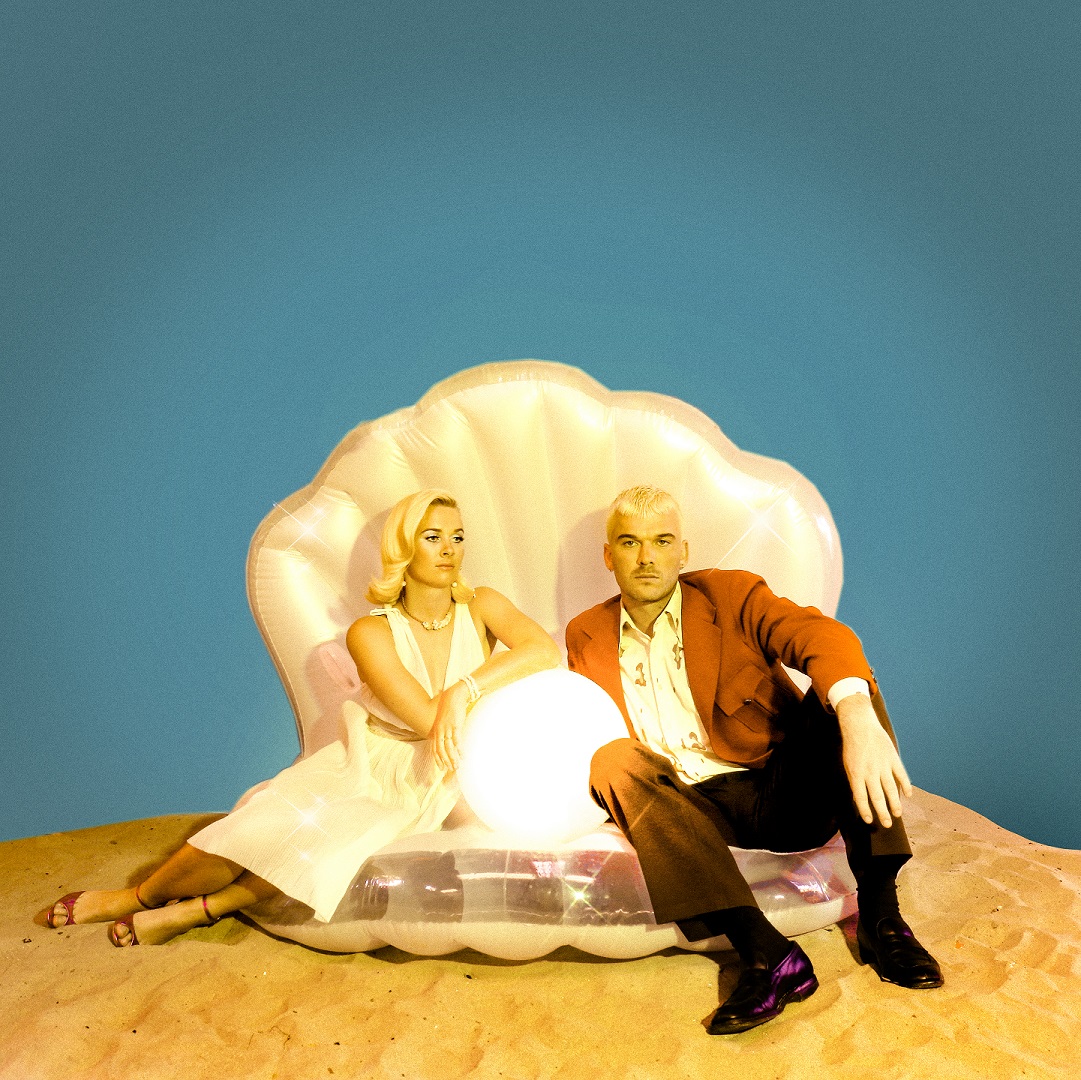
It’s encouraging to know that you don’t need to be on a major label to be doing what you want to do!
Georgia: I think for what we want to create now, it suits us a lot better to be on a more indie label.
I think the joke’s on the label too, because this is definitely your poppiest record yet!
Georgia: You reckon?! yeah; maybe…
Caleb: I don’t think so; I thought the last one was, probably. It’s definitely the most upbeat and the most energetic.
Georgia: The thing is, it can be poppy but still bring your own alternative thing.
Caleb: You can still be original in pop music; that’s what people keep on forgetting. You don’t actually have to make a cookie-cutter fucking pop song. Everyone, stop ruining reggaeton; it’s not yours. Leave it to the people who know what it is!
Georgia: Just enjoy it as it is!
Caleb: Don’t fuck with it.
Georgia: I think that’s the thing. People kill ideas completely, and they just bleed them dry. I think we were just like, “We’ve tried following the formula before and it didn’t work, so let’s just do whatever the hell we want and try that out this time!
Caleb, a few years ago you and I discussed Conscious, and I really got a sense that you had grown a lot as a producer.
Caleb: Yeah, definitely. On this one (I grew) even more again. A lot more of me came out on this record!
Is that you singing on “Too Proud”? Is that your first time singing on a Broods song?
Caleb: That’s me singing.
Georgia: Singing lead, anyway.
Caleb: Yeah, and “Old Dog” was produced by me!
It’s great to hear your voice!
Caleb: It was the first time I had heard it, as well – and Georgia, and [our producer] Joel!
Georgia: I think it was just one of those experiences… Writing this record was just like, completely… “Let’s try everything!” Let’s do whatever we feel that way – and that’s how we found the most authentic version of ourselves, which is cool.
The album is absolutely gorgeous. It’s ambitious, eclectic, and intelligent, and it feels like it has a certain purpose, that Conscious and Evergreen perhaps didn’t quite have.
Georgia: I agree!
Caleb: We didn’t really have time to develop a purpose for the other records. I mean, we wrote and recorded the first one in five weeks! This one’s been done over two and a half years.
Georgia: I think we also kind of found our purpose as people, and that helps. We kind of had to start making decisions for ourselves when we were independent. We had to start leaning on our own instincts a lot more. I think our going through that experience leads into the music a lot.
Caleb: It’s like we completely lost ourselves, and then found ourselves within this album!
Georgia: Which seems to happen a lot, anyway! We’re probably going to do it a few more times in the next year (laughs). It is like that though; I think it shows that there were so many moments of being lost, and there were so many moments of feeling found within our record. I think the way that it flows as well – when it finishes with “Everything Goes (Wow)” and “Life After,” it’s almost like we’re closing the book on the lifespan of the album and what we went through, through that writing process and the people we let go of and the people we were able to become because we let go of our old selves. I was thinking about this the other day… it finishes with a song that’s about what we imagine heaven to be like, and moving on to the next world. I think it’s almost symbolic of letting go of who we were and the past, and really opening ourselves up to something new in this record. That’s totally what we did.
I was thinking about how The Beatles were only around for seven years. How did they do what they did in such a short amount of time?
Georgia: But The Beatles, every single album brings a new version of them – because you change so much as a human being! It’s funny… When we started making music and felt like we needed to find “our sound” or something, our mum would always say, “Look at The Beatles! They changed their sound all the time; you can do that too, if you want.” Cheers mum!
She’s right!
Georgia: I know, and I think like… I know that because it comes from us every time, it will always feel cohesive without us trying too hard. It’s like…
Caleb: We just want to keep things fresh! As much as people would make Evergreen ten times,
You don’t need to be Evergreen!
Georgia: It already exists.
Caleb: No, no; if anyone was asked to do the same thing over and over again…
I think it's so cool that each of these records is so different. You have transformed so much over each album. They’re really from distinct periods.
Caleb: We’re different people each time.
Georgia: With Evergreen, I was 19, he was 21.
Caleb: I was 21, but I had no idea what I was doing.
Georgia: Second one we were 20 and 22, and then we’ve taken three years to figure out who the fuck we are. Honestly, I feel like the moment you think you know who you are, you close yourself off to realizing who you actually could be.

You’ve talked about your writing sessions in Nicaragua, and how some of these songs were inspired by turning your mind off from the outside world and learning more about yourselves. Can you talk a little more about that? Was that a new process or sort of experience for you?
Georgia: It was the first time we’ve ever done a writing camp like that.
Caleb: The first time we’ve submerged ourselves in the writing.
Georgia: You’re with the same people in the writing camp, and you’re always together: You eat together, you sit up and smoke doobies together at night… We would go to a swim all together at sunset, and the water was so warm; it was such a…
Caleb: Just a bunch of like-minded people, hanging out, making stuff –
Georgia: – living in bliss and talking art and talking feelings. I think when you’re around people that exist on the same level as you, you can completely feel at home and let all your walls come down. For us, being in that situation, that’s where we wrote “Too Proud,” “Hospitalized,” and “Everything Goes (Wow).” Those three songs are about completely different things.
Caleb: They sound completely different, because we wrote them with completely different people, each one. But it was in the same place though, so they all have this energy…
Georgia: This like vulnerable, but also confident vulnerability. It’s a self-awareness; it’s an acute self-awareness where you are not afraid of your emotions, but at the same time… it’s a liberating thing!
It’s an acute self-awareness where you are not afraid of your emotions.
That speaks so much to the entire record – and you both know it way better than I do, -
Georgia: – but I like that you totally get that from it, too, because it means that we’ve done our job the way that we’ve meant to. We’ve gotten our point across!
The name Don’t Feed the Pop Monster is so formidable. At a glance, what is this album about, for you?
Caleb: Do what you want to do.
Georgia: Like we were saying before, we have been in the position where we felt like we’ve kind of veered in a direction of “what we should be doing,” and felt like we should be accepting of someone else taking control over our art.
Caleb: And we let it happen because we thought it was necessary for us to get anywhere in our career, and we’ve kind of realized that it’s bullshit. Once you realize that no one in the music industry knows the fuck they’re doing… and it doesn’t matter how you do shit; it’s gonna work, if it’s gonna work – then you just kind of like,
Georgia: You let go of a lot of expectations, which we’ve done. We let go of a lot of pressure to be a certain thing, especially when it felt like we were just, not being patronized into it, but… people know how to influence young people, and we were so young!
Caleb: Sometimes, you almost push yourself into that kind of place because you see people taking over and surpassing you, who maybe were your fans in the first place. It made you think, “Maybe I need to do something similar to get somewhere,” but really we’re just going to do what we have to do.
Georgia: The amount of times I’ve thought that maybe we would be more successful if we did this, or if I looked like this, or if I said this, or dressed like this… And then you start thinking, “Well, that’s a really, really big commitment to try and be somebody that I’m not all the time,” and also everybody’s place in the industry is different! Everybody’s experience of the industry is different, and once you accept that, you stop comparing yourself to other people.
Caleb: I think you just stop focusing on different people who do well differently. No one’s worried about what Bon Iver’s wearing, you know? But everyone’s connecting to his music.
Georgia: (laughs) Nobody can understand what the fuck he’s saying; I don’t even know what he’s saying, but I agree with it!
I think you did get there, maybe not in the eyes of 100 million people, but at least in the eyes of one!
Georgia: That’s the thing that we have started to realize as well.
Caleb: It doesn’t matter how many people are following you.
Georgia: It’s about the impact; it’s not about the following.
Caleb: Even if it changed one person’s life, that’s enough for us.
“Tell me, now, what’s the new black? Did it change while I was blinking?” You open with “Sucker,” this really cool entrance about fads and cultural, with this affirmation of certain tenets or pillars that define your core: “But I always come back to the same old things - my Stevie and Sting.” Why open the album with this message, and with this song?
Georgia: I think it’s kind of like the most Don’t Feed the Pop Monster song on the record, if that makes sense?
Caleb: It also sets the tone for the way we wrote the album; how it was a lot more nostalgic, than trying to be relevant by being current. Instead of looking for the newest sounds or samples, it’s more about having substance. Someone told me, while we were writing this record, that great songs have something new, something present, and something from the past. You should have some influence from a time ago, and some influence from right now, and also be thinking about what’s next.
Georgia: And with the whole “what’s next” thing, you just have to guess! But for us… I don’t know. Stevie and Sting were huge influences to us – more Sting while we were growing up. Fleetwood Mac is like a new nostalgia. That song is still one of my favorites, and I think it’s just such a good way to start because it does set the tone to the attitude that we had going into this, which is: We all get caught up in what’s in and what’s cool, and trying to keep up with what we should be thinking/feeling/wearing/saying. And then at the same time, it’s not until you actually come back into yourself that you really can be an authentic version of yourself. That’s what we did with this record: We totally retreated into ourselves, and we kind of swam right to the bottom of ourselves and dug deep! It’s quite liberating to get that personal. It’s weird, because as personal as the record is, I’m so not afraid of people hearing how vulnerable we can be; I’m just not afraid at all!
It’s not until you actually come back into yourself that you really can be an authentic version of yourself.
So it’s really true to you.
Georgia: I’m not embarrassed that I’m super emotional. I’m not embarrassed that I think I’m going crazy 24/7. I think those are the parts of me that I love the most.
Caleb: When you do let that take over, you kind of find, in a way, you just let yourself kind of be… you don’t hang on to emotions or anything; you just kind of let them flow through you, and love them no matter what they are!
Georgia: Each one serves a purpose, you know.
Georgia, last year over email we spoke about “Peach,” and you told me, “I want to feel the full spectrum, no matter how many times I have to break and put myself back together to do that.” This theme of experience was our first introduction to your new album. What is so special and important about “Peach”?
Georgia: I think it really sums up what the last couple of years have been like for us. We’ve had these crazy, crazy highs where we’ve been so excited and so happy, and so liberated – and then we’ve also had these times where we’ve felt completely and utterly invisible. I think that’s the worst thing – when you feel invisible and numb, that’s worse than any sadness, anxiety or anger. Feeling invisible and numb is the scariest feeling ever, and I think that letting go of the control over what you experience, and letting go of having to be a certain thing helps with that a lot…. Helps with that feeling of being worried about being visible, or feeling like nothing and stuff. It’s so much better to feel something, than nothing. I don’t know, people numb themselves all the time! I’m so guilty of doing that all the time, but I think this is kind of a reminder that it’s necessary to feel everything.
It’s so much better to feel something, than nothing.
I think this album’s moodier content may take listeners by surprise at first, but halfway through the record I was listening to “To Belong” and found myself asking, what just happened!? I felt like I was lost in this trance of the music! Can we discuss these songs and how they came to be?
Georgia: It took us like a year from start to finish.
Caleb: I feel like with “To Belong,” we really were patient with it. It’s six minutes long, but it doesn’t feel like it’s six minutes long. It’s just about not cutting it short because it looks too long, and letting it be whatever it needs to be.
Georgia: I feel like the best way to describe writing that song is that we all closed our eyes and just felt for the song! “How about this? How about that?”
Caleb: The producer was so unsure about it so many times, and we were just like, “Nope! Just keep going; just let it happen!” And now, it’s one of my favorite songs on the record.
It is really special, because it’s so different!
Georgia: Yeah, and I think it will be really special live, too!
Caleb: And that’s more of us tapping into our influences from Thom Yorke and Radiohead.
Georgia: I think the artists that inspire us the most are the artists that don’t really follow the rules, and so we kind of wanted to throw away the rules too. The Gorillaz, Radiohead…
Caleb, let’s talk about your singing on “Too Proud.” How did this come about?
Caleb: I have not smoked a cigarette for six months! I guess, like what we were talking about before, about numbing yourself. I went through months and months where I numbed myself because nothing much was going on. That was my way of making time pass, because I didn’t feel like I was using my time to the best of my abilities, and I didn’t feel like I was being used to my potential by the people I thought should be. I didn’t think I was really getting appreciated for what I was able to make, and that got me really down, you know to where you don’t believe in yourself at all. And so I had a really low period, and didn’t notice until I came out of it, that I was in that low period.
Georgia: You just accept it as normal to feel like that all the time
Caleb: because it’s a slow descent usually, you know? It’s not something that happens overnight, that you get down. It’s a very slow descent, and a lot of different things happen… but once you decide that you don’t want to descend anymore, it’s actually quite easy to push back up again and get out of it – if you really want to – but first of all, you’ve got to realize that you’re doing it, which is hard sometimes! So the funny part is that it’s the most emotional song I’ve definitely ever written, but it was the happiest week of my life! That day was one of the best days ever… but, you know…
Georgia: And I was there, being like, “I feel like nobody believes in me,” and all… That was something that we both felt for a while. I have, since I was a kid, been a super anxious person. I’ve had to learn to get myself out of those headspaces a lot, especially when we first started touring and stuff. So I feel like when Caleb went through this whole situation, it was different, but it was in a way really similar to what I’d been through before. So I was like, “This is going to make you so much more able when this comes up again – ‘cause it will,” and it always does! It’s not something that you go through once and you’re like, “Sweet! That was shit.”
It’s like in “Peach,” how you want to feel it all.
Georgia: And you should be able to completely bathe in the happy times, but at the same time you do need to know how to breathe through the shit as well.
Happiness is not worth anything if you haven’t known sadness
Georgia: No, and you don’t understand or appreciate it if you don’t have both. I love the fact that we’re super emotional; I think it means that we care! And it means that you can connect with people better.
Caleb: I think we’ve found a lot of wisdom over the last couple of years, but mostly because of the people we surround ourselves with in LA are people who encourage that kind of conversation.
Georgia: Super open people… For a couple of cancers, we’ve really taken off our shells a lot in the last couple of years. Oh my god, on the Fourth of July last year I was running around on the beach like, “I’ve lost my shell! I don’t know where it is!” and I was thinking, it’s kind of what it is for us: We are naturally supposed to be very protective of ourselves, but through this process of writing this album, we’ve kind of like been, “Fuck it, hit me! Hit me with this tidal wave.”
Caleb: You get a little bit of water up your nose.
Let’s talk about another prevalent theme on this album. “Falling Apart” was the first whiff that I got of the influence of this moment in history on the record. “There’s a fault in the system, so much talk in the system, so much empathy missing, and it feels like everything is falling apart.” I love that line, and the song so effectively captures what it felt like in 2017, 2018, and now in 2019!
Caleb: That’s why we’ve got to put it out tomorrow; I think America needs it right now.
Georgia: We did write that song the week of the election.
Caleb: All our friends from America were just blank, distraught.
Georgia: They were completely shaken by the fact that not everybody had the same opinion.
Caleb: Everyone was crying constantly, and we were just like, “holy fuck.. should we move back to New Zealand?”
Georgia: (laughs) I went to an election party, and there was a cardboard cutout of Hillary Clinton – she had heels and a scarf on, and everybody was drinking wine and laughing, and excited… And as the night dragged on, we could feel this huge weight. Our friend, I remember… she was just walking around in shock, crying… And then our other friend is like, “Where’s Ashton? Am I getting punk’d?” I was with my friend who is also from New Zealand… I think it really brought to light the fact that people need to talk to people that aren’t like that. People can’t just build an echo chamber around themselves. You can’t learn from people who are exactly like you.
Caleb: Don’t stay in your bubble! Have the conversations. You can’t expect people to think differently, if you’re not going to help them think differently.
Georgia: Or try to understand where they’re coming from as well, ‘cause I think people were so comfortable up on their high horses.
Caleb: It’s so easy to judge.
Georgia: It’s easy to judge something that you don’t have a full picture of! I think that’s the biggest thing: It’s not who’s right and who’s wrong – although there are some very clear things in my head! – but you can’t talk at each other; you have to talk to each other. That’s something that I think had to happen, and in a way, this whole situation that feels like everything’s falling apart – everything has to kind of be ripped apart, so that you can put it back together in the right way.
Caleb: The Jenga tower needs to fall completely over, with all the bits missing, before you can build it into the perfect tower again.
Everything has to kind of be ripped apart, so that you can put it back together in the right way.
The song “Old Dog” is so fun; I feel like it’s this affirmation of female identity, and the name is such a great way of capturing that.
Georgia: When we wrote that, we were with our friend Allie. She’s the epitome of, “You can’t teach me any new tricks!” So she came into our house after the camp we went on with her, and we started writing a song. She said, “On the way here, I was thinking about how once you get older, it’s harder for people to pull the wool over your eyes and teach you new tricks, influence you to act a certain way,” and I totally got that. It’s funny, because at the time I thought I got it… listening to it the other day, I was like, “Holy shit, I really get it!” It’s kind of evolved to be even more powerful to me: Just another mind to mould, do I look like a stray wandering around with nowhere to go? I think people assume that you need them… that you need their guidance… It is kind of this story as old as time, that women cannot think for themselves.
Caleb: “Try to wash off my fleas… Get your piss off my trees.”
Get that leash off me.
Georgia: I don’t need you to show me how to be a lady I’m an animal, baby. That’s my favorite. I think this whole thing of what a woman is supposed to be is slowly starting to erode, and I think that is so beautiful. Feminism and being feminine can look so many different ways, and it can act so many different ways. I think it’s really exciting to think where we can take the world when women can be authentic versions of themselves as individuals.
Caleb: I think the production matches the tone, too.
Georgia: Oh yeah! “Punkesque.”
Caleb: It’s definitely a throwback kind of vibe. When I was making it, I was like, “This sounds like if B-52s made a song with Fatboy Slim” or something like that!
There’s a little old, there’s a little of today, and there’s a little new!
Georgia: It was so fun to write and record that with her.
Caleb: We had a couple of samples from a movie to start off with, but we weren’t allowed to use them. There was a Marilyn Monroe film where the first line was like,
Georgia: (high voice) “I don’t know anything about music?”
Caleb: (deep voice) “You don’t need to know anything music; just listen to it, that’s all!”
Georgia: We’re going to keep it in for the live show!
Bringing it all back together, this album is out now in one week, next Friday!
Georgia: Shit!
How do you feel?
Georgia: I think we’ve just been home for Christmas and New Year’s, and we’ve been like in La La Land enjoying summer with our family. And so now we’re just like, “Holy shit. The album is coming out, the album is coming out.” But it’s good to be busy the week leading up to it, because it really builds this whole event around it, and makes you sit in your creation a little bit. It is a surreal experience, releasing an album.
Especially one that’s so special!
Georgia: And one that’s taken so long! It’s all exciting.
Caleb: We finished writing it over a year ago.
Well what’s cool about that is that, everything you're talking about in a record from over a year ago is still relevant and still important today.
Caleb: Maybe even more relevant!
Georgia: Like “Old Dog.” I think that’s the beauty of when you say something that is so brutally honest, you can’t take away anything from it. You can’t steal any of its importance, and you can’t diminish any of its relevance because it’s so true to who we are. I think a song like “Dust,” that song is like my soul. I think a lot of the things we’re singing about, we’re singing about human nature! It’s not going to change – not on the level we’re talking about, anyway. I think that’s cool!
— —
:: stream/purchase DFTPM here ::
— — — —
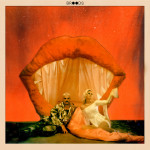
Connect to Broods on
Facebook, Twitter, Instagram
Discover new music on Atwood Magazine
? © Dana Trippe

